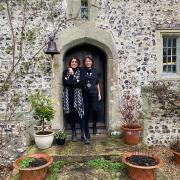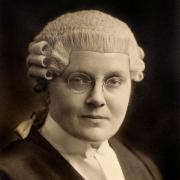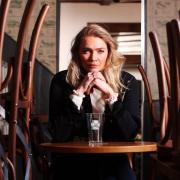A photograph inspired Samara Levy to launch an appeal which has now clothed 100,000 refugees. She tells Duncan Hall why

Back in August 2014 the idea of sending one lorry load of aid to Syria seemed an insurmountable problem to Samara Levy. But in the last two years she has been responsible for organising a total of 46 lorries and containers sent to refugees and displaced people in Iraq, Syria and Jordan. And in May she helped set up a hospital in a particularly dangerous area of Syria.
It was one detail from a photograph of young refugees published around Christmas 2013 which set the 38-year-old on what she describes as a rollercoaster ride. “I remember thinking how could it be possible any child should have to wear flip-flops in the snow,” she says. “My youngest child was 15 months old and starting to walk – that idea was close to my heart. We live in a beautiful warm house, with central heating, double-glazing, with more than enough food and clothes. I just wondered how their mothers were coping living in a tent with their children from day to day with no shoes to put on their feet. I kept thinking we had so much.”
She began by simply emailing the mothers in her son’s year group asking for donations of winter clothes and shoes. Although she had given to charity before she had never been particularly active. “If people were doing a run or something then I would give to that,” she says. “I used to feel frustrated when I saw things going on in the world. But putting money into something and not knowing any more about it seemed very impersonal.”
Initially she became a little disenchanted with established charities who weren’t interested in helping her transfer the aid to where it was needed. “I didn’t know where I could send it,” she says. “When I contacted lots of charities they were only interested in the money side, collecting clothes so they could sell them and get the money. What we raise is spent on what we are raising it for. None of us get paid. We rely on people giving their skills, expertise and resources – we’re looking for someone at the moment to help with our accounts. There are so many amazing people around the country who give so much. So many charities have to be fed with money to keep them ticking over, when the amount of help that comes out the other end is very small. I loved seeing there was another way.”
Since that first lorry load was sent overseas – two-and-a-half weeks ahead of schedule –Samara and her team of volunteers have funded 11 ambulances, put together more than 2,000 first aid kits and clothed more than 100,000 people. Collections have been organised by more than 150 churches and organisations up and down the country. Samara’s Aid Appeal has collaborated with Link To Hope, which offers them free storage space, and Feed The Hungry. It has partnerships with non-governmental organisations helping distribute the aid at the other end of the route. Samara hasn’t been over yet herself, but keeps close contact with each NGO to ensure the aid gets to where it needs to be. Each lorry costs £6,500 to send overseas. “It happened little by little,” she says. “At the end of each appeal I have felt stretched beyond my capacity to do any more. If somebody had told me this is what I was aiming for I would have run a mile. From the first lorry I had no idea what I was involved in. I don’t have a degree in international development or charity work. I just felt the problem was so awful. We live in such luxury. I couldn’t sit back and do nothing to see the suffering of ordinary people who had done nothing wrong. What’s the use of feeling compassionate unless you can sit up and do something?”

Like the mountaineer who reaches the summit of one peak only to find another higher challenge awaiting them, Samara feels her job could be never-ending. “The problems are not going away,” she says. “As long as I’m in a position to help these people how can I stop? Once you are on the roller coaster it’s very hard to leave it.”
In setting up Samara’s Aid Appeal, which operates under the auspices of registered charity Feed The Hungry, she feels she may have found her place in the world. Prior to having children she had worked in sales and recruitment, before retraining as a nurse and setting up her own cake business. “With each of those jobs I have loved them, but never felt they were me,” she says. “I feel I was born to do this.”
Alongside providing clothing and vital supplies to troubled areas, a big responsibility is to keep the stories of displaced people alive.
“It’s very much about raising awareness,” she says. “There are so many awful things going on the media can’t cover them all. It takes people like us to keep it in the forefront of people’s minds. Syria is the worst humanitarian crisis of our generation.
"Conservative figures for the number of people killed are more than 270,000 – although some estimate the figure is much higher than that. More than a million people have been injured in the conflict, and 10,000 people are in need of prostheses. There are more than 6.5m people displaced inside Syria. Three-quarters of the population are living in poverty, and 67 per cent of them in extreme poverty. Those figures are difficult to comprehend. For any country it’s an enormous legacy to leave behind. If they are to rebuild life then hope is needed. We need to do as much as we can to support them.”
The focus is now on their Syrian hospitals – the locations of which are being kept secret as doctors and nurses have previously been targeted by so-called Islamic State. The first opened in May, with the second due to open last month, and the third at the end of August.
“They are risking their lives being there,” says Samara. “A few years ago four doctors were captured by so-called Islamic State and executed on their way to work. We are praying for their protection and safety.”
Help to heal
Plans for the four hospitals Samara’s Aid Appeal wants to open focus on providing critical care. The first hospital, which is located in a desert in an area of intense fighting, has no running water or electricity. It relies on a generator and large water tanks being brought in from the outside. The fund also supports a mobile operating room, making the medical professionals less of a warzone target. With an estimated 200 hospitals destroyed in Syria during the civil war it is only a drop in the ocean.



























